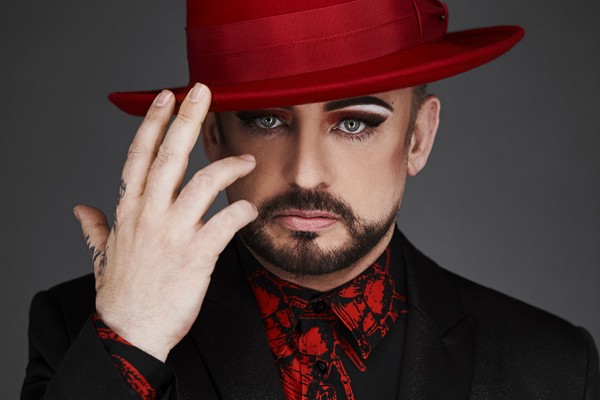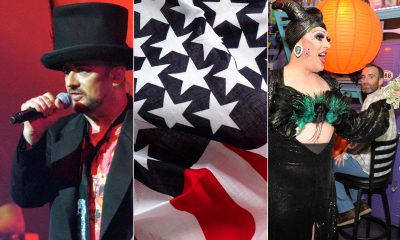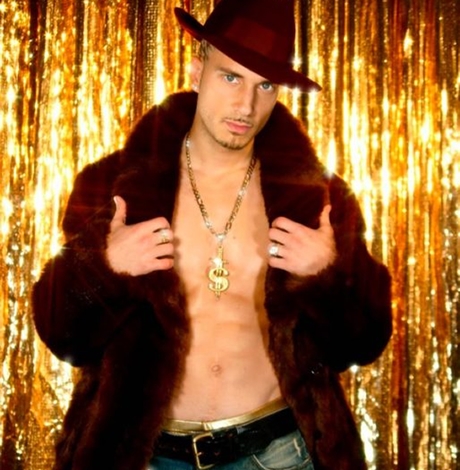Music & Concerts
Boy George on new Culture Club album, Wolf Trap concert July 18 and his affinity for astrology
Pop legend prepping new band record for fall release
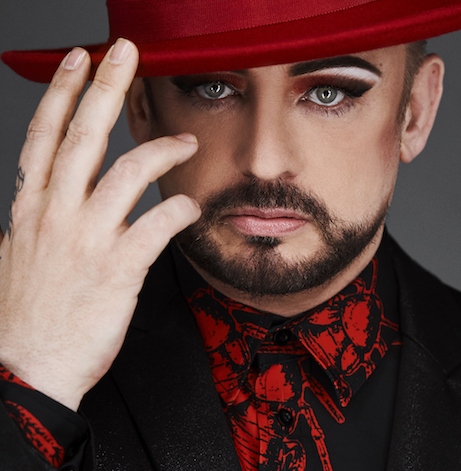
Boy George has never been one to fade away.
Since he first appeared on the music scene as the gender-bending, eccentric Culture Club frontman in 1981, George has commanded attention from his fan base, his peers, like his good friend Cyndi Lauper, and the media.
Now, Culture Club is releasing “Tribes,” their first album in nearly 20 years, this fall. According to George, the long-awaited release is “the best record we’ve ever made.” While fans wait a couple more months for new tunes, they can get their Culture Club fix during the band’s the “Life Tour” stop at Wolf Trap which includes the B-52s and the Thompson Twins’ Tom Bailey (show details are here).
George took a break from recording and touring to chat with the Blade about his passion for astrology, the dangers of social media and just why it took Culture Club almost two decades to release a new album.
WASHINGTON BLADE: Culture Club is going to be releasing new music for the first time in nearly 20 years. Was there pressure to release new music?
BOY GEORGE: A lot of it has just been that we weren’t working together. The fact that there was a 20 year gap was just accidental. We’re a funny band because we never really split up. We never hated each other at all. We just drifted apart. I was doing my own thing and they were doing whatever they were doing having kids, getting arrested. It’s just one of those things. It’s so weird the way things pan out. This particular record has been probably about five or six years in preparation and then some more problems came up. Not really insurmountable problems, really, just where the band was going. I was looking for a new manager. We disagreed on who was going to be the manager. Jon [Moss], Roy [Hay] and Mikey [Craig] ended up going off with someone else and I found myself a great manager and that’s really what made it work. If you’d had said to me 20 years ago “There’s going to be a point in history where you’ll have two managers” I would have just laughed at you. But, actually, it really works. It’s just a funny thing because all that stuff gets in the way of the most important thing and that is the creativity. It’s really nice that we’re now mixing the record. Every day we’re getting mixes in and I think it’s the best record we’ve ever made.
BLADE: What aspects of recording with Culture Club do you prefer over recording independently?
BOY GEORGE: It’s a very different process. You have to be much more tolerant. I think recording is always free flowing even when you make your own record. You’re still working with people that you respect and love. You let people do their thing. I’m sure there are other musicians who are very controlling and they know what they want. But whenever I go into the studio I know what the song is but I never really know completely where I want it to go. I let a lot of it happen in the moment. I think that’s what makes recording exciting. I would say the same process applies to Culture Club. This time we worked with two young producers and they definitely brought something unique to what we were doing. I really was excited by what they contributed. I would say they were probably more controlling than we were. Bands are crazy and we have no sense of time. Rock and roll people don’t do time. I’ve never worn a watch in my life. I’ve been given some really expensive watches for free but I’ve never really worn one. I think the producer’s job is to come and just control the whole thing and say “OK, we’re going to go this way.” In my experience, recording sessions have always been very respectful, free flowing. It’s just a very open environment. In fact, probably the most fun thing I do is recording. I think that I would probably spend my life in the studio but that wouldn’t be particularly practical.
BLADE: I don’t know if you’re into astrology at all but you’re a Gemini and your persona appears to have a duality to it. Have you found that to be a blessing or a curse?
BOY GEORGE: First of all, I’m one of those people always talking about star signs. People are like “Shut up!” I’ve always got a lot to say about people’s star signs and how people are so typical of their star signs. I think that’s very true. I think that I’m also very typical of my star sign in the sense that I’m always of two minds about everything. I can come off stage and I could have had a really great show but I’ll also be moany about it. It’s that thing of like the twins and split personality that’s very much a part of who I am. Sometimes people perceive it wrongly. We [Geminis] are called two-faced but we are able to see both sides of every situation. It has nothing to do with being two-faced. We’re very sure about what we feel. But we’re also open to having our minds changed and I think that’s where people get confused about Gemini. So I think that I’m a typical Gemini.
BLADE: Concert culture is very different from when you first started out. Now, people are on their phones recording or taking photos when an act is on stage. How do you feel about that?
BOY GEORGE: I think it’s fascinating. The last couple shows we’ve done I pointed out people in the front row without phones. I actually made a big thing and said, “Look there are people in the front row without phones. Impossible.” I’m one of those people that believe that people having that attitude all the time is pretty unhealthy. So, there are lots of times when I don’t take my phone with me to dinner. I try not to sit on it all the time. I try to go outside into nature, take a walk. There is a sense that people are having a third party experience with everything that they do and it’s a little bit sad. It’s harder to dance when you’ve got an iPhone in your hand. It’s harder to really let go. I think people are just obsessed with these things. But you’ve also got to let people have the show they want to have. You have to let people have fun on their own terms. So, I’m not one of these people who gets annoyed. I’ve absolutely done it. I’ve stopped shows before, a long, long time ago. And then I turned a corner and was like “You can’t control this. This is not important. This is just going to get in the way.” So I just stopped doing it. It worries me sometimes when people around me just all they do is look at their phones. You know, followers and likes are not for money. It doesn’t mean anything. I come from a time when artists made a cultural impact through the things they said and did. That interests me far more than how many people have liked my photo. But I also know it’s a part of life and a modern phenomenon. I love the aspect that I can say “Happy birthday” to someone in Vietnam or Australia and I can talk to fans in a direct way. It’s all about getting it into perspective, I think.
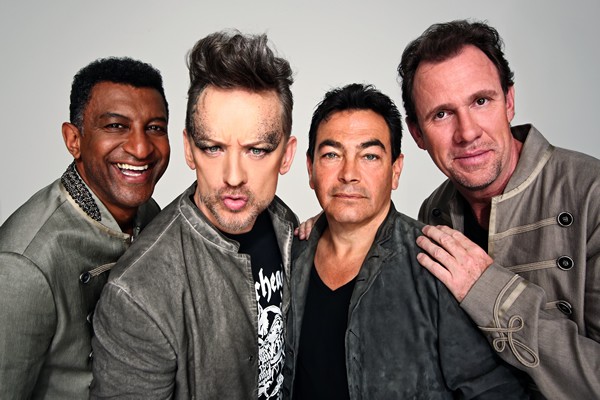
Culture Club is (from left) Mikey Craig, Boy George, Jon Moss and Roy Hay. (Photo by Dean Stockings)
BLADE: You’re such a vet in this industry but what’s the most recent industry lesson you’ve learned?
BOY GEORGE: Nobody knows what they’re doing. That’s what I’ve learned. My life policy is basically we’re all clinging to a rock but some of us have a better grip than others. The more I’m in this business the more I’ve realized that with music, we are one of the most creative industries in the world, and yet some of the people running it are deeply uncreative. And I think that’s why live music has become so important for artists like me because it’s the one place where you’re completely in charge. You’re completely authentic even though I hate that word. It’s such a buzz word. But you are in charge. This is me, this is my music. Nobody’s in the way. I love the spontaneity of live shows because it’s really the last place where nobody can pretend to be you. Nobody really gets in your way. I love that and that’s why I think live shows are the best. It’s so great to be in a situation where you can just be yourself.
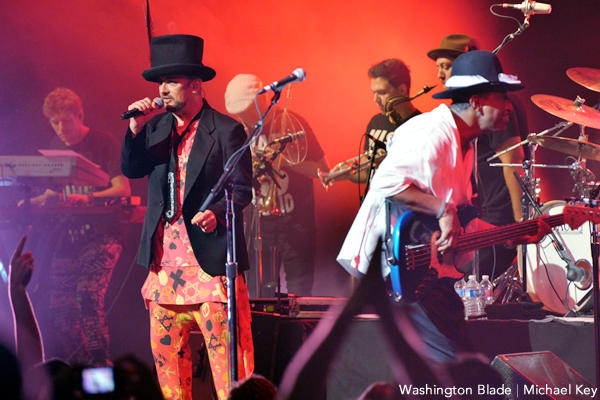
Photo of Boy George performing at Wolf Trap with Culture Club on August 10, 2015. (Washington Blade file photo by Michael Key)
Music & Concerts
Washington chorale kicks off Christmas with vibrant program
‘Thine Own Sweet Light’ concerts planned
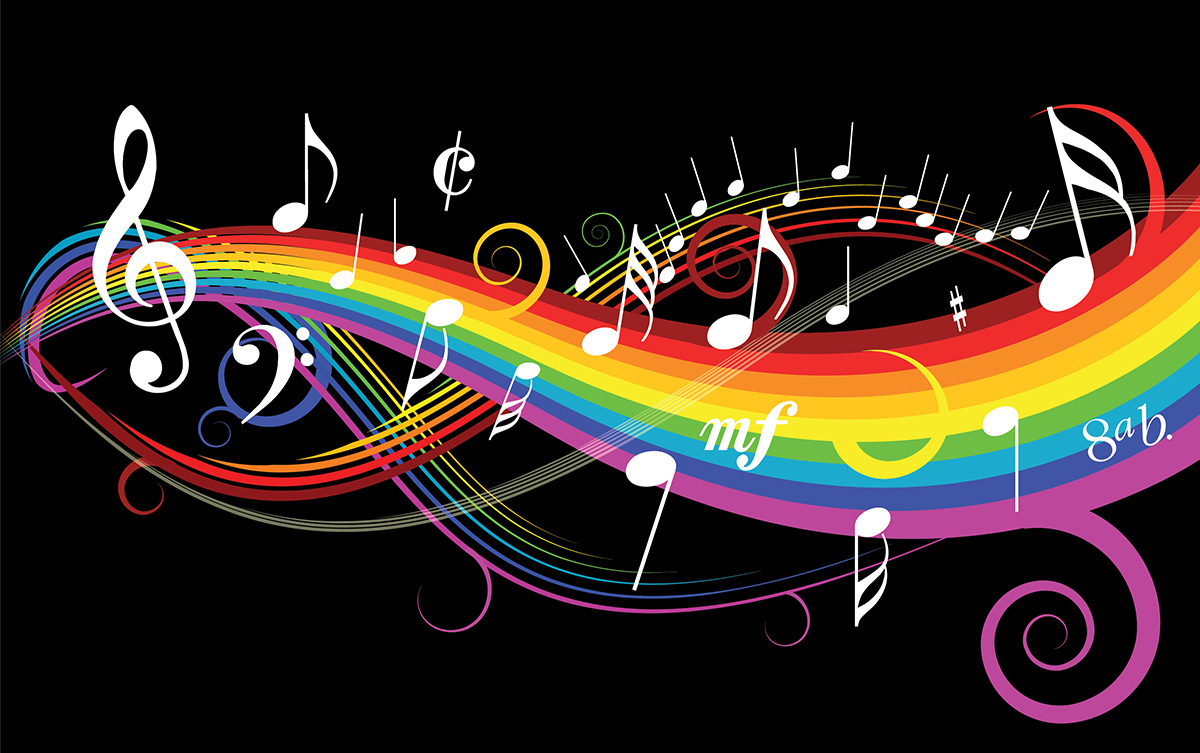
The full Washington Master Chorale will return for its annual holiday concert tradition with “Thine Own Sweet Light” on Friday, Dec. 19 and Sunday, Dec. 21 at St. Ann’s Catholic Church (D.C.) and Church of the Epiphany (D.C.).
The concert will feature the rich sounds of the 50-voice, a cappella chorus performing lush, seasonal choral music inspired by the theme of light. Highlights include Edvard Grieg’s “Ave Maris Stella,” Eric Whitacre’s “Lux Aurumque,” and Christopher Hoh’s “Holy, Holy, Holy is the Lord God of Hosts.” The program will also present a new work by Barcelona composer Josep Ollé i Sabaté, along with charming holiday folk songs and seasonal favorites.
For more details, visit the Washington Master Chorale website.
Music & Concerts
Queer mega stars (and allies) ready to take D.C. stages this fall
Watch LGBTQ icons light up stages across the DMV as they sing, dance, and drag their way through spectacular shows.
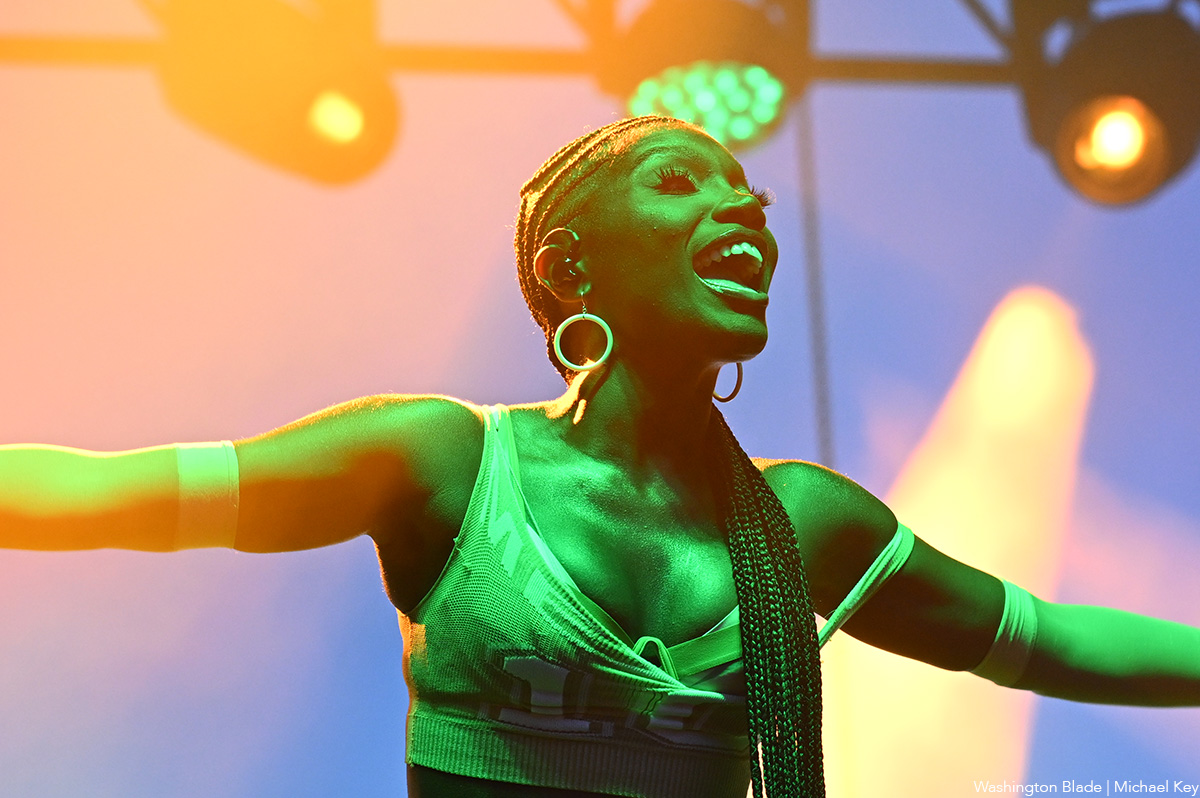
One of the best ways to welcome fall is by catching LGBTQ performers (and their allies) lighting up some of the D.C. area’s biggest stages. From country and pop to drag and rock, the season is packed with shows you won’t want to miss.
Maren Morris – The country, rock, and pop diva—known for hits like “The Bones” and for standing up against Nashville’s anti-LGBTQ voices—takes the stage at Wolf Trap (1551 Trap Rd, Vienna, Va.) on Friday, Sept. 12 at 8 p.m. Tickets start at $64.
RuPaul – The mother of modern drag and host of “RuPaul’s Drag Race” will spin a DJ set at Echostage (2135 Queens Chapel Rd NE) in Northeast D.C. on Sept. 20. Before RuPaul swaps wigs for headphones, Trade and Number 9 owner Ed Bailey will warm up the decks. For tickets and details visit echostage.com.
Conan Gray – The queer pop prince, celebrated for his Gen Z anthems like “Heather” and “Maniac,” brings his Wishbone Pajama Show to EagleBank Arena in Fairfax, VA, (4500 Patriot Cir) on Sept. 20 at 8 p.m. Tickets start at $113. For more info visit shop.conangray.com/pages/tour.
All Things Go Music Festival – With a lineup that includes Noah Kahan, Lucy Dacus, Kesha, Clairo, Doechii, and more, the beloved LGBTQ-friendly festival takes over Merriweather Post Pavilion (10475 Little Patuxent Pkwy, Columbia, Md.) Sept. 26–28. For tickets and details visit allthingsgofestival.com.
BERTHA: Grateful Drag – This unique tribute brings drag artistry and the sounds of the Grateful Dead to The Atlantis (2047 9th St NW) on Sept. 27. Tickets start at $47 at theatlantis.com.
Peach PRC – Rising Australian pop star and out lesbian, whose confessional tracks like “Perfect for You” and “Forever Drunk” have made her a queer TikTok darling, performs at The Atlantis on Sept. 29 at 6:30 p.m. The show is general admission only. Additional details are on theatlantis.com.
Addison Rae – The TikTok star-turned-pop princess, who’s crossed over into music with glossy hits like “Diet Pepsi” brings her sold out show to The Anthem (901 Wharf St., S.W.) on Sept. 30. Tickets are sold out, but resale options start around $80. For more info visit theanthemdc.com.
The Rocky Horror Picture Show 50th Anniversary – Celebrate the cult classic that’s been a queer midnight-movie staple for decades, with Barry Bostwick (a.k.a. Brad Majors) at the Warner Theatre (513 13th St., N.W.) on Oct. 2 at 8 p.m. Tickets start at $41 via Ticketmaster.
Chaka Khan, Patti LaBelle, Gladys Knight & Stephanie Mills – Four legends, one stage. Between Khan’s funk, LaBelle’s soul, Knight’s R&B, and Mills’ powerhouse vocals, this concert at Capital One Arena (601 F St NW) on Oct. 3 at 8 p.m. promises pure diva magic. Tickets start at $103. For more details visit capitalonearena.com.
Lorde – Joined by The Japanese House and Chanel Beads, the Grammy-winning New Zealand singer-songwriter behind “Royals” and “Solar Power” returns to The Anthem on Oct. 4 at 7 p.m. Lorde has long been embraced by queer fans for her dreamy pop and subversive lyrics. For more info visit theanthemdc.com.
Andy Bell (of Erasure) – The British queer rock icon, best known for synth-pop classics like “A Little Respect” and “Chains of Love,” brings his Ten Crowns Tour to the Lincoln Theatre (1215 U St., N.W.) on Friday, Oct. 17 at 8 p.m. Tickets are $90.45.
Doechii – The self-described queer “Swamp Princess”—and WorldPride 2025 headliner—continues her breakout year with the Live from the Swamp Tour at The Anthem on Oct. 21 at 8 p.m. Known for blending rap, R&B, and avant-garde performance art, Doechii is one to watch. Tickets start at $153.
Neon Trees – The out-and-proud Utah rockers behind “Everybody Talks” and “Animal” perform at the Lincoln Theatre on Friday, Oct. 24 at 8 p.m. Lead singer Tyler Glenn, who came out publicly in 2014, has become a strong queer voice in alternative rock. For tickets and info visit impconcerts.com.
Sasha Colby – The “RuPaul’s Drag Race” Season 15 winner strips down on the Stripped II Tour at the Warner Theatre on Nov. 2 at 8 p.m. Tickets available now on Ticketmaster.
Lola Young – The bisexual indie-pop sensation, whose raw songwriting has earned her millions of TikTok fans and multiple chart soaring hits visits The Anthem on Nov. 9 at 8 p.m. Tickets are still available.
Opera Lafayette
Featuring Mary Elizabeth Williams as Dido
+ Elijah McCormack, Chelsea Helm
Oct. 16, 7:30 p.m.
Sixth & I
PostClassical Ensemble
The Pale Blue Do: A Musical Voyage Inspired By Nature
Featuring National Geographic’s Enric Sala, Guest Curator
Wednesday, November 19, 7:30 p.m.
Terrace Theater
Washington Concert Opera
Starring Kate Lindsey, Theo Hoffman, John Moore, and Fran Daniel Laucerica
Nov. 23, 6 p.m.
Lisner Auditorium
Washington Master Chorale
An intimate a capella concert taking place in an architectural jewel, featuring cherished choral gems from Anglican and Catholic tradition and early American hymns. The concert will also present the world premiere of Christopher Hoh’s Holy, Holy, Holy is the Lord God of Hosts, and hymn singing featuring Robert Church, organist and choirmaster at St David’s.
Oct. 18, 7:30 p.m.
October 19, 5 p.m.
St. David’s Episcopal Church
Music & Concerts
Cyndi Lauper ready to have fun in Virginia
Superstar to bring final leg of farewell tour to Jiffy Lube Live
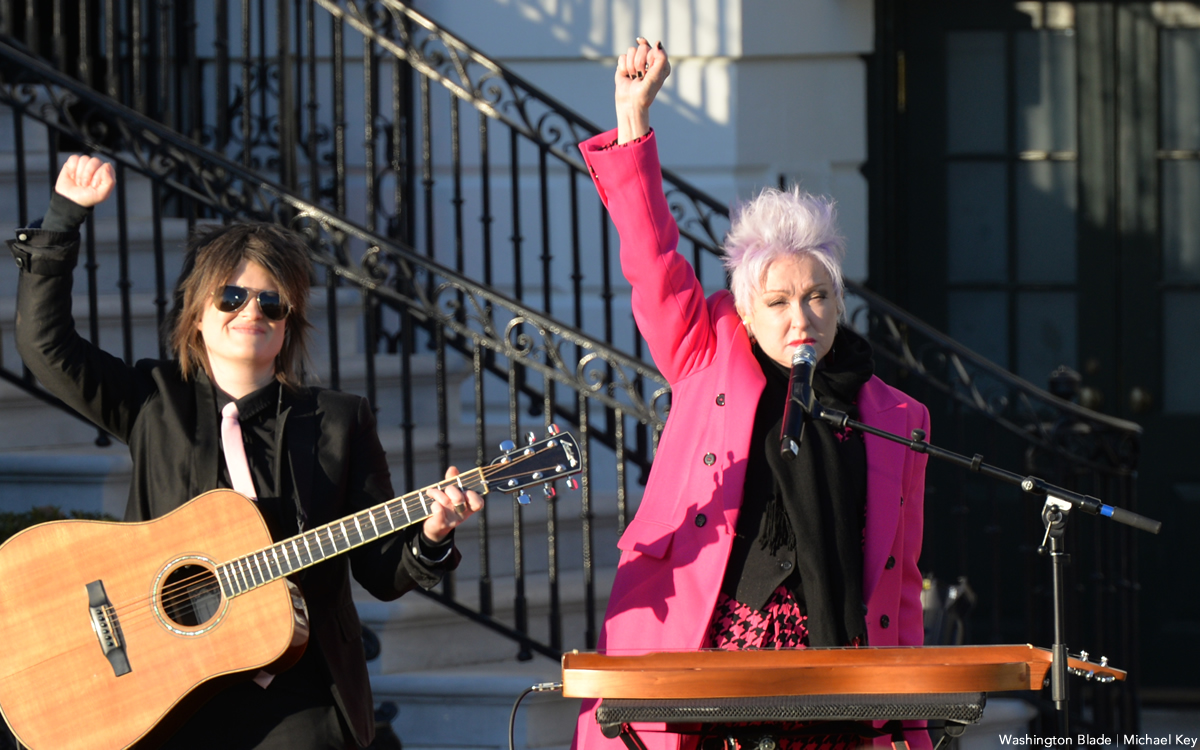
Superstar Cyndi Lauper will bring the final leg of her farewell tour “Girls Just Wanna Have Fun” to Bristow, Va., on Thursday, July 24 at Jiffy Lube Live.
Lauper’s international Farewell Tour – her first major headlining run in a decade – kicked off in North America last October, and included her first time ever headlining (and selling out) Madison Square Garden. Lauper’s performances have earned raves from the New York Times, Rolling Stone, Billboard, and many more, and surprise guests have included Chaka Khan, Sam Smith, and Hayley Williams. The tour just visited the U.K. and Europe, and will head to Australia and Japan in April.
Tickets are available on Live Nation’s website.

